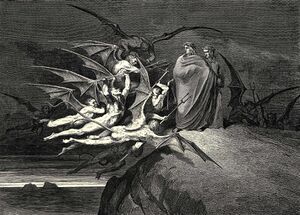Sluagh: Difference between revisions
(Created page with "{{wip}} Category: Carna thumb|300px| ''[[David and the Sluagh'' by {{wp|Alexander Nasmyth}}]] The '''Sluagh''' ({{wp|Old Irish|Gallawan}} ''slúag'', {...") Tag: 2017 source edit |
mNo edit summary |
||
| Line 6: | Line 6: | ||
== Etymology == | == Etymology == | ||
The {{wp|Scottish Gaelic|Carnish Gaelic}} name ''Slúagh'' stems from the {{wp|Old Irish|Gallawan}} ''slúag'' (≈ ''slóg''), meaning 'host, army; crowd, assembly'. Variant forms include ''slógh'' and ''sluag''. It derives from the {{wp|Proto-Celtic}} root *''slougo-'', whose original meaning may have been 'those serving the chief', by comparing with {{wp|Baltic languages| | The {{wp|Scottish Gaelic|Carnish Gaelic}} name ''Slúagh'' stems from the {{wp|Old Irish|Gallawan}} ''slúag'' (≈ ''slóg''), meaning 'host, army; crowd, assembly'. Variant forms include ''slógh'' and ''sluag''. It derives from the {{wp|Proto-Celtic}} root *''slougo-'', whose original meaning may have been 'those serving the chief', by comparing with {{wp|Baltic languages|Orenstian}} words that probably emerged from early linguistic contacts with Celtic speakers in Eastern and Southern [[Levantia]]: e.g. ''slaugà'' ('service, servitude'). | ||
==Tale of David V== | ==Tale of David V== | ||
Revision as of 20:12, 14 March 2022
This article is a work-in-progress because it is incomplete and pending further input from an author. Note: The contents of this article are not considered canonical and may be inaccurate. Please comment on this article's talk page to share your input, comments and questions. |

The Sluagh (Gallawan slúag, Carnish Gaelic Slúagh; Ænglish: 'host, army, crowd'), or Sluagh na marbh ('host of the dead'), were the hosts of the unforgiven dead in Carnish folklore. In the words of Carnish folklorist Lewis Spence, "In Carna the Sluagh, or fairy host, was regarded as composed of the souls of the dead flying through the air, and the feast of the dead at Hallowe'en was likewise the festival of the fairies." Usually taking a crescent form, similar to a flight of grey birds, they were said to be able to approach and pick up a person from any direction and then transport them far away through the air, from one area of Carna to another. Although they could sometimes rescue humans lost in the wilderness, they were generally portrayed as dangerous to mortals.
Etymology
The Carnish Gaelic name Slúagh stems from the Gallawan slúag (≈ slóg), meaning 'host, army; crowd, assembly'. Variant forms include slógh and sluag. It derives from the Proto-Celtic root *slougo-, whose original meaning may have been 'those serving the chief', by comparing with Orenstian words that probably emerged from early linguistic contacts with Celtic speakers in Eastern and Southern Levantia: e.g. slaugà ('service, servitude').